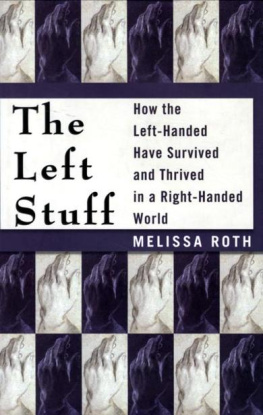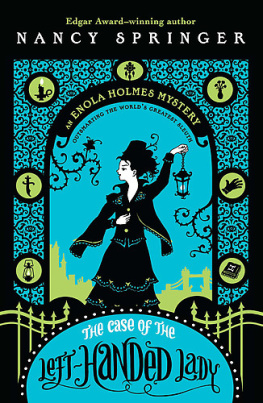Thank you for purchasing this Free Press eBook.
Join our mailing list and get updates on new releases, deals, bonus content and other great books from Free Press and Simon & Schuster.
C LICK H ERE T O S IGN U P
or visit us online to sign up at
eBookNews.SimonandSchuster.com
Contents
This book is dedicated to my co-investigators:
Diane Halpern, Clare Porac, and Alan Searleman.
Without their research contribution and their insight, much of the knowledge and theory that is presented in this book would not exist.
Preface
At various times in history, left-handedness has been regarded as many things: a nasty habit, a social inconvenience, or a mark of the devil. It has also been taken as a sign of neurosis, rebellion, creativity, artistic ability, musical ability, psychopathology, mental retardation, criminality, homosexuality, genius, sports proficiency, or empathy. Our long fascination with handedness is shown by its mention in the Bible; references to it appear in some Egyptian tomb writings.
The problem of handedness has caught the attention of many thinkers and scientists including Charles Darwin, Benjamin Franklin, William James, and Thomas Carlyle. Over the past twenty years or so, researchers have shown that left-handedness is more than a minor difference. Increasingly we are coming to understand that left-handedness has social, educational, and psychological implications and affects many aspects of health, well-being, and even life span.
This book focuses on all that distinguishes right- and left-handers. It demonstrates that handedness is only one part of sidedness, which also includes footedness, eyedness, and earedness, and shows readers how to measure their own sidedness. The book answers some common questions such as: Where does handedness come from? Is it coded in the genes? Does it stem from social pressure? Might it indicate some damage or injury? Is it related to the organization of the brain, and how?
Further, the book examines the differences between left- and right-handers in terms of intelligence, personality, creativity, and a number of other domains.
Left-handers may be one of the last unorganized minorities in our society, with no collective power and no real sense of common identity. Yet they are a minority that is often discriminated against by social, educational, and religious institutions. Social customs and even our language set the left-hander apart as different and probably bad.
This book in some sense records a journey of exploration begun when a scientist came across a surprising set of research findings. The resulting program of investigation, which extended over more than ten years, led that scientist to the shocking conclusion that left-handers probably die younger than right-handers. He also found that most risks to which left-handers are especially vulnerable have to do with the way in which the right-handed majority treats the unseen left-handed minority. This scientist here offers ways in which the left-hander can be made both safer and more comfortable in a right-handed world.
Acknowledgments
I would like to thank many people who helped me directly and indirectly in the preparation of this book. People in my laboratory at the University of British Columbia over these many yearsincluding David, Wong, Wayne Research Council of Canada, who have funded my research over the past two decades. Finally, my gratitude goes to my invaluable co-investigators over the years: Diane Halpern, Clare Porac, and Alan Searleman, to whom this book is dedicated.
S. C.
Vancouver, Canada
1

Beliefs and Stereotypes
About Handedness
A neglected minority group constitutes about 10 percent of the present human population. Like many other minority groups it has been subject to prejudice, humiliation, and discriminationnot on the basis of race, religion, age, or national origin, but simply on the basis of the hand that its members use for such everyday acts as brushing teeth or cutting food. This group consists of left-handers. Right-handers might feel that words such as discrimination used with reference to left-handers are a bit overdone or melodramatic. I (a right-hander) certainly would have felt that way when I began researching the psychology and neuropsychology of handedness some twenty years ago. But through that research it became clear to me that most of us do have a set of often-unacknowledged attitudes toward left-handers that express themselves in condescension and even scorn.
Language and the Left
For proof of negative attitudes toward left-handers we need go no further than our own language. The very word left in English comes from the Anglo-Saxon word lyft, which means weak or broken. No less defines left-handed as meaning crippled, defective, awkward, clumsy, inapt, characterized by underhanded dealings, ambiguous, doubtful, questionable, ill-omened, inauspicious, and illegitimate.
Common phrases in the English language demonstrate a negative view of left-handedness. For instance, a left-handed compliment is actually an insult. A son from the left side of the bed is illegitimate. A left-handed marriage is no marriage at all, but an unconsecrated or adulterous sexual liaison, as in the phrase, a left-handed honeymoon with someone elses husband. Thus, a left-handed wife is really a mistress. A left-handed diagnosis is wrong, and left-handed wisdom is a collection of errors. To be about left-handed business is to be engaged in something unlawful or unsavory. Sailors speak of ships that are left-handed, meaning that they are unlucky or wrong in some way. Someone talking about your sex life who calls you left-handed has labelled you a homosexual; bent to the left carries the same meaning.
Not one positive phrase is to be found in the language surrounding left or left-handed. Right and Right-handed seldom seem to connote anything more than favoring the right hand for various activities. A right-handed wife simply describes a married woman who favors the use of her right hand. In those few instances where there is any emotional content, right carries a positive connotation. Thus to be someones right-hand man means to be important and useful to that person.
One must not suppose that speakers of the English language have a unique dislike of left-handers. The tendency appears to be universal. For example, in French the word for left is gauche, which also conveys the meanings crooked, ugly, clumsy, uncouth, and bashful. The word gauche has been taken over directly in English with its negative connotations intact. A person who acts inappropriately in a social situation is said to be gauche.
The German word for left-handed is linkisch, which also gets the dictionary definition of awkward, clumsy, and maladroit. The left-hander does no better in Spanish, where the word for left-handed is zurdo. It is used in phrases such as no ser zurdo, which means to be very clever, but literally translates as not to be left-handed. A similar picture appears in Italian where a left-hander is mancino, which is derived from crooked or maimed (mancus) and is also used to mean deceitful or dishonest. The bad press of the left-hander in Italy, however, is a historical carry-over from the Latin, in which the word for left is sinister, closely related to the noun sinistrum, meaning evil.
Eastern European languages continue the tradition of denigrating left-handers. In Russian, to be called a left-hander (levja) is a term of insult. One variant of this term is used to refer to a black-marketeer, while from the same root comes the phrase na levo, meaning sneaky. The word for left in Polish is quite similar (lewo); it also conveys the idea of illegal, and is often used to refer to a sneaky or underhanded trick. Similarly, in Romany (the language of the Gypsies) we find bongo, also the term used to describe a crooked card game, a fixed horse race, or a wicked and dishonest person.
Next page












